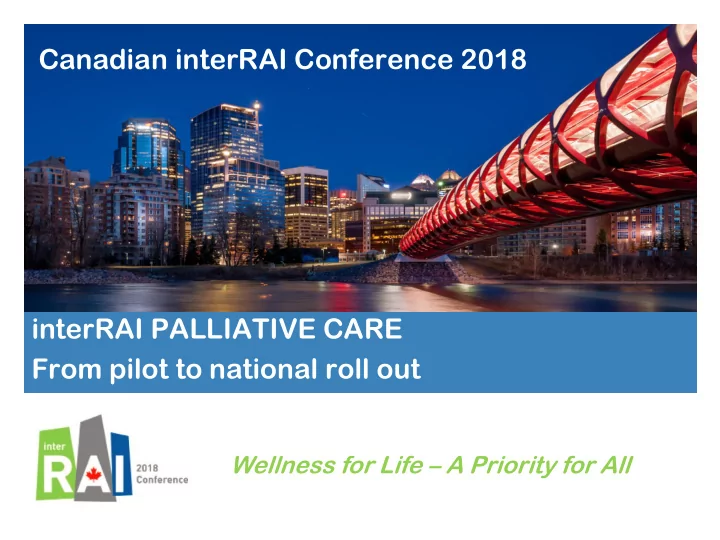

Canadian interRAI Conference 2018 interRAI PALLIATIVE CARE From pilot to national roll out Wellness for Life – A Priority for All
New Zealand New Zealand Aotearoa Aotearoa 2 Source: hemamaps.com.au
Home Care assessments for palliative clients To access home and community support services (n= 37,000 in 2015/16) 1676 = 4% Homecare assessments of total assessments completed for people with 6 months or less to live (in 2015/16) 3
Pilot areas • 13 assessors across three 13 District Health Boards 162 • 162 assessments 4
Proposed potential benefits Relevant and appropriate for client group Focus on areas of importance to clients and families Less time consuming 5
interRAI Palliative Care assessment Premise Identify • need for comfort • Strengths • minimise distress and • Preferences maximise function • Needs • community, hospice or hospital settings 6
Results Assessors and clients liked the new instrument. Adequate information for care plans ‘Fit for purpose’ Symptom list was indicative of conditions for this group Acknowledges clients’ reality and feelings 7
Palliative Care Pilot – Feedback from assessors December 2015- CONs PROs December 2016 8
Assessors’ goal: Wellness for all Improving symptoms Addressing mental and physical health problems Assisting in coming to terms with death Enhancing comfort Improving quality of life 9
Board agreement • interRAI New Zealand Governance Board approves: • roll out of training and • use of Palliative Care assessment. • Incorporate lessons learned from the pilot 10
Assessor competencies Homecare trained Level 1 APC or DHB equivalent training 2-hour training programme Clinical assessment reviewed by Educator Palliative Care on-line evaluation Competency interview 11
Roll out phases Train the Expressions of Training educators interest from Assessors community groups • Develop • Feedback from competencies for sector to improve • Additional training to educators compliment interRAI course delivery training • Develop • Developing on line competencies for • Additional training training module resources developed assessors 12
Training points to consider Culture Romanticised view of people finding peace Acknowledge our own beliefs and feelings Varied awareness and understanding Need engagement 13
Additional training for assessors 1. When to use the palliative care assessment 2. www.advancecareplanning.org.nz 3. Dealing with distress: Have a non Contact Create a safe Ensure a plan for judgemental someone who space ongoing support approach can offer support 14
Grief vs depression Characteristics Normal grief Depression Nature of response Adaptive Maladaptive In response to a particular loss and does Focus of distress Pervasive and affects all aspects of life not affect all aspects of life In waves but generally improves with Symptom fluctuations Constant time Protracted and constant depression or Mood Sadness and dysphoria flat affect Intact, although engagement in activities Interests/capacity for Anhedonia with markedly diminished may be diminished because of functional pleasure interest or pleasure in all activities decline Episodic and focal loss of hope; hopes Hopelessness is persistent and Hope may change over time, giving positive pervasive orientation toward the future Maintained self-worth, although feelings Worthlessness with feeling that one’s life Self-worth of helplessness are common has no value Guilt Regrets and guilt over specific events Excessive feelings of guilt Passive and fleeting desire for hastened Suicidal ideation 15 Preoccupation with a desire to die death
Useful language – Talk about: Limited Focus on symptom treatment Focus on management/treating options quality of life symptoms Supportive care Living well Focus is no for now curative/not rehabilitative Comfort care As you near the end of this journey…… Age related concerns 16
Participants: CAPs triggered for interventions 100% Percentage of assessments 75% 50% Trigger level 2 Trigger level 1 25% 0% CAPs 17
Figures to date Assessors PC Data analysis trained: assessments: coming: 46 out of 518 www.interrai.co.nz/d Home Care ata-and-reporting assessors 18
Thank you to Karyn Foley (PM), Cindy Gibb (SW),Brigette Meehan, Marg Milne, Jacqueline Joseph, Karen Goymour, Jason Theobald 19
Recommend
More recommend